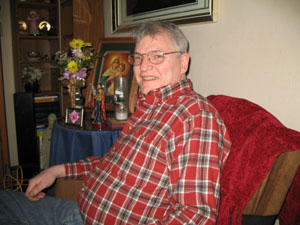By Margie Wuebker
mwuebker@dailystandard.com MINSTER -- Darrell Kelbel says a new experimental treatment for the cancer in his liver has bought him the needed time for the cure he believes is coming.

Kelbel, an employee of The Dannon Co., continues to recuperate from a procedure performed in late November. Doctors hope it will give him another five years -- time in which researchers may find the elusive cure.
"Immunotherapy bought me a year," Kelbel says. "An experimental procedure called liver perfusion could give me another five. The hope is researchers will find a cure before time runs out."
The six-hour procedure in late November involved exposing the liver through a large cross-shaped incision and infusing heated chemotherapy drugs directly to the liver. The blood supply was isolated so the rest of the body was not affected by the treatment.
Clinical trials have been under way at the National Institute of Health in Bethesda, Md., but Kelbel found a doctor at the University of Cincinnati who also was using the technique in selected patients. Kelbel, a 55-year-old father of two, never expected a malignancy when he went to the optometrist in 2000. Tiny shapes called floaters danced through his field of vision leaving one dark spot behind.
The appointment led to consultations with a retinologist in Dayton and then an ocular oncologist in Cincinnati, where a needle biopsy confirmed the presence of cancer cells.
"I had a tumor growing between the retina and the back of the eye," Kelbel explains. "The news hit like a punch in the stomach that leaves you breathless."
A specialist implanted a radioactive disc behind the tumor and the Minster man spent the next eight days in a lead-lined room at the University of Cincinnati Hospital, one of only three facilities in the nation offering the procedure.
Radiation shrank the tumor, but it never disappeared. Cancer cells began multiplying in 2003 and this time treatment involved zapping the mass with a cryolaser.
"I had pain in the back of my eye in 2004 and sure enough the thing was growing again," Kelbel says. "The specialist told me it never read the book on how tumors are supposed to react to treatment."
Surgeons removed the eye later that year and performed head-to-toe scans to determine whether cancer cells had traveled elsewhere.
"This form of ocular cancer has a nasty habit of moving to the brain, liver or lungs," Kelbel's wife, Pat, says. "It chose my husband's liver."
The oncologist prescribed weekly immunotherapy treatments hoping the potent drugs would kill the cancer. The eight-hour sessions left him nauseated and unable to eat.
Kelbel's road to recovery took a gut-wrenching turn when the surgeon ordered more tests and found an inoperable mass roughly the size of a golf ball.
Their hope was renewed when they heard about the experimental procedure in Cincinnati.
Except for a longer than expected stay in the intensive care unit, the liver profusion treatment went flawlessly.
The Kelbel family, which includes 25-year-old Ryan and 15-year-old Andrea, was told not to expect improvement before six months had elapsed. A recent three-month checkup indicated some tumor shrinkage.
"My doctor is tickled pink at this point," Kelbel says. "The last two years have been pretty rough and finally we have something positive for a change."
The Kelbels admit dealing with cancer has been a roller coaster ride of sorts with exhilarating highs and depressing lows. They expect more twists and turns around the next bend.
"We enjoy each day and thank everyone who has helped along the way," Pat Kelbel says as her husband nods in agreement. "You can always look around and see someone with a heavier cross." |

